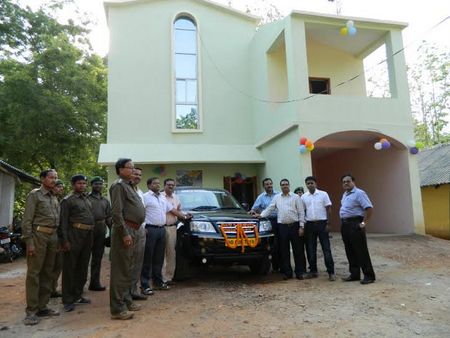Similipal Tiger Reserve, May 15, 2014: To facilitate rescue of wild animals in Similipal Tiger Reserve (STR), Wildlife Trust of India (WTI) in collaboration with the Forest Department and Animal Works (AW), launched a rescue centre and Mobile Veterinary Service today, in the biosphere reserve.
The Field Director of STR, Dr Anup Nayak, who was present at the launch, appreciated the initiative and said, “The MVS unit will handle the rescue and rehabilitation of wild animals in Similipal landscape including adjoining Kuldiha sanctuary area in Balasore district.”

The MVS will be conveniently located at the fringe of STR at Pithabata Wildlife Range Office in Baripada and poised to immediately respond to any wildlife emergency which may arise. “For the first time, the state of Odisha will have a dedicated mobile unit manned by trained veterinarian and caretaker to attend to wildlife emergencies reported from the region. The objective will be to return every displaced animal to the wild. All releases would follow the IUCN guidelines on translocation and placement of confiscated animals,” said Dr NVK Ashraf, Chief of Wild Rescue and Conflict Mitigation, WTI.
He further added, “The unit will be served by a small field station that will have basic facilities to accommodate temporarily displaced animals till their release. Non-releasable animals will be sent to zoos for lifetime care and breeding. Thanks to Similipal Tiger Conservation Fund and Animal Works, Australia for their support and making this project a reality.”
The 1,555.25 sq km Similipal Buffer Zone has 65 villages, with a population of over 12,500 people, mostly within the Reserve Forest. An estimated 250,000 people from nearly a dozen tribal denominations reside in over 400 villages on the fringes of Similipal Tiger Reserve.
Anthropogenic pressures withstanding, khand shikar or ritualistic tribal hunting for herbivores also ends up disturbing the habitat and affecting the prey base of tigers in the area.
Dr Ashraf further compounded on the above saying, “We also have plans to help create awareness drives amongst the local villagers on how to deal with and respond to different conflict scenarios which is invariable when you have so many people living in such close proximity to a wildlife reserve.”
Last year, Wildlife Trust of India, with the assistance of the Forest Department, had carried out an awareness-based Rapid Action Project (RAP) in the area, which had resulted in ten hunters, from the local tribes of STR, surrendering their bows and arrows and vowing to help protect the wildlife of the reserve.